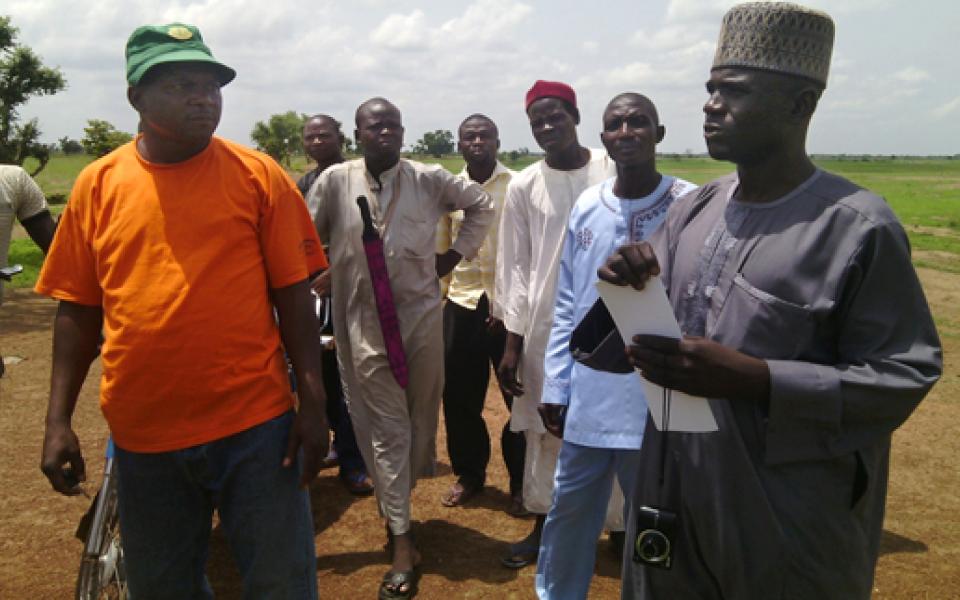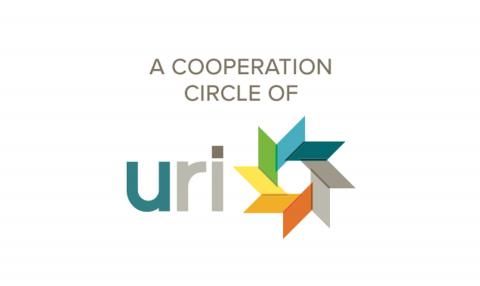
Presentation of Mr Enoch Nyayiti Raymond, Chair of the Center for Environmental Education and Development (CEED), at the mini retreat ‘Political Strategy Against Land Grabbing for West Africa’ on the 1st and 2nd of May, 2015 at Abuja Nigeria
Let me express my gratitude to the Heinrich Böll Foundation Nigeria/West Africa office to be invited to attend its Mini Retreat on ‘Political Strategy Against Land Grabbing for West Africa,’ which is situated within the framework of its Nigeria/West Africa programme. I shall strictly share our experiences as outlined below.
The Campaign Strategy at Gassol Against Dominion Farms:
Against the cumulative expressions and frustrations of the farmers of Gassol community in the Gassol Local Government Area of Taraba State, Center for Environmental Education and Development with Environmental Right Action/Friends of the Earth Nigeria (ERA/FOEN), GRAIN and the World Development Movement (Global Justice Now) UK joined together to undertake a field trip and hold discussions with farmers. The objective was to hear out the farmers where they stand on the land grab for the land in question.
It has been the coming together of these organizations from 2014 until now that constitutes the story in the media on the land grab question in Gassol, Northern Nigerian state of Taraba. This is because both organizations view land grabbing as a contentious issue of large-scale land acquisitions, which result in the buying or leasing of large pieces of land in developing countries, by domestic and transnational companies, governments, and individuals, and the powerlessness of the farmers in the process to protect land which enhances their livelihood.
Moved by the stories of the powerlessness of the farmers telling their stories about the process of land negotiation and acquisition leading to the introduction of the Dominion Farmers Ltd USA to the site of the land in question, the organizations listed above came together and agreed on a fact-finding mission to Gassol Community that will scientifically afford them the opportunity to learn from the perspectives of the farmers, hear from the farmers and not from the government officials, newspapers reports and other interviews granted by government officials.
The fact–finding mission was intended to also discuss and hear firsthand from the farmers, of their resistance methodology with a view of sharing best practices and methodologies on building resistance based appropriately on land rights.
It must be mentioned that Dominion’s activities in Nigeria and in Taraba State are relatively new. In 2012, the company began a process to establish its satellite in Nigeria, and so have a large rice farm project in the Northern Nigerian state of Taraba. The company proceeded to sign an MOU with the Federal Government of Nigeria, represented by the Federal Ministry of Agriculture and Rural Development (FMOARD) and the Taraba State Government, excluding the farmers who had been owners of the 38,000 hectares of land developed and managed by Upper Benue River Basin Development Authority since 1976.
After four working days at Gassol Community, a report was written on our visit and four things were achieved. They are:
- Visit to the farm land in question
- Firsthand information on the location of Dominion Rice Farm Ltd on the farm land
- Discussion with both government officials and farmers (more specifically, on the common strategy to pursue their rights)
- Exclusion of the Federal Ministry of Water Resources and UBRBDA in the land deal
Given the scenario above, several telephone conferences’ discussion was held among us to agree on the best strategy to mobilize national and international attention to the plight of the farmers of Gassol Community.
Short Introduction: How It All Started in 2012
In 2012, Dominion Rice and Integrated Farms, Ltd came to Nigeria after its unsuccessful rice farm operation in the Yala Swamp area of Western Kenya, where local farmers also suffered loss of their lands and livelihoods. It had grave social, environmental, and health impact on the affected communities.
In February 2012, in the far-away Capital City of Nigeria, Abuja, without due consultation with farmers in Gassol, an MOU was signed by FMOARD on the one hand, and Dominion Farms and the Taraba State Government on the other.
No transparency was shown to the farmers in the consultations held with the government officials. The relevant step that is supposed to be taken to safeguard and protect the land rights of the local farmers was relegated to the background. Attention was given more to the promotion of the interest of the Dominion Farms Ltd rather than interest of the farmers.
Obstacles in Getting the Facts on Dominion
Initially, Center for Environmental Education and Development (CEED)/ERA/FOEN gathered its findings from newspapers reports nationally and internationally on the introduction of Dominion Farm Company to the Nigerian Government and to Gassol Community. In the circumstances therefore, the only way to ascertain reliability of facts was to reach out to stakeholders concerned. In the course of our mission, we approached the following:
- The Taraba State Ministry of Agriculture Jalingo
- Taraba State Land and Survey Bureau office
- The State office of the Upper Benue River Basin Development Authority (UBRBDA)
- Jalingo
- UBRBDA Farm Office in Gassol
Discussion with Farmers Association and Farmers
We could not reach Calvin Burgess of the Dominion Rice and Integrated Farms, Ltd due to the fact no one from the institutions above provided us with his contact. In all these efforts, we could not get the officials of Government to release or provide us with a certified true copy of the MOU signed by parties (i.e Taraba State Government, Federal Government of Nigeria (FGN) represented by FMOARD) and the Dominion Farms Ltd.
Our efforts to the State Bureau for Land and Survey to submit an available evaluation and survey plan to the Taraba state government for consideration proved abortive. We were only told that the Taraba State Government is willing to pay the compensation to the communities in installments.
How the Campaign Against Dominion was Organized
Following the initial discussions among the organizations mentioned, earlier it was agreed that since CEED is the organization based in Taraba State and that its staff are familiar with the environment, the culture of the people, and local languages, it should provide the technical lead in the course of conducting the fact-finding mission while the staff of ERA/FOEN Nigeria joined in the mission.
Structured questioners were then developed and date set for the activities on the 9th -16th of June, 2014. The conclusion of the visit to the community and meeting with key and relevant stakeholders informed the report generated after those days mentioned.
After our initial report, the first action was to conduct a telephone conference to review the work done, proffer solutions on our campaign methodology that we intend to put forward, and resources for such activity. It was thereafter agreed, since Dominion Farm Ltd had a track record of not taking into account farmers’ rights.
How Did We Achieve Getting International Coverage & Support?
Our initial plan, as a team interested in land grab work after our consultations with farmers, was to organize a formal workshop titled “Farmers – Media Interface with Policy Makers in Nigeria,” where we hoped to make a press statement among others.
We also planned to have farmers from Kenya attend the event, to share experiences as a community on how they suffered or otherwise as a result of the conduct of Dominion Farms’ farming activities. But we adopted the strategy of e-launching of the report. Global Justice Now and GRAIN also did a lot to internationalize the report, utilizing their close work with the international media.
From London to Abuja to Texas: Reaction of Politicians / Reaction of Calvin Burgess
There is no doubt that the fact-finding reports have had the desired impact and immediate reaction from politicians home and abroad. We succeeded also in hearing from Mr. Calvin Burgess of Dominion Farms Ltd. The e-publication of our fact-findings report has attracted a lot of attention from media and international development organizations like the DFID.
The media cut across Nigerian media and the international media. We recorded media interviews from media outfits like the Sahara Reporters Media Group, and individual journalists such as Martin Guttridge-Hewitt from UK joined in to give coverage to the matter. Others, like Gethin Chamberlain, a Photojournalist also from the UK who works with the Guardian UK, also got interested on the matter. Here in Nigeria, leadership, Guardian Newspapers, and Vanguard covered the story, among other newspapers we did not know to reach up to.
What Is Next?
We already have plans to work with relevant local and international organizations, institutions, researchers, and policy makers to push forward a land rights agenda in Nigeria. We plan also to hold a session in Nigeria to popularize the land issues with a view of ensuring that the right approach strategy protects vulnerable farmers, and communities are not rid of their land resources.

